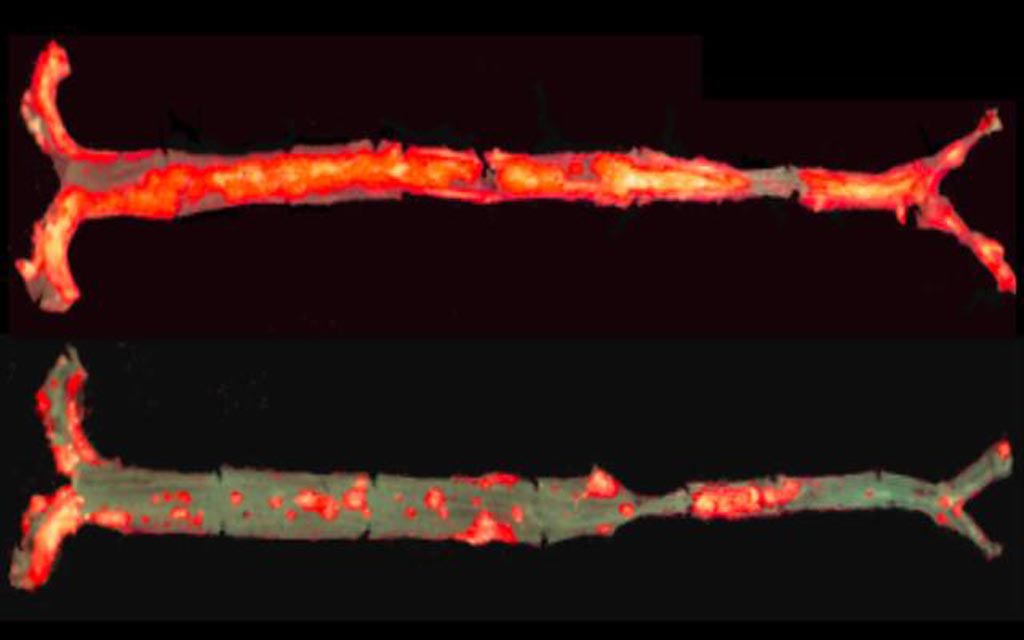Model Demonstrates Link between Phospholipids and Atherosclerosis
By LabMedica International staff writers
Posted on 20 Jun 2018
A fragment of an antibody known to block the uptake of oxidized low-density lipoprotein (OxLDL) by macrophages and inhibit the proinflammatory properties of oxidized phospholipids (OxPL) was shown to prevent atherosclerosis in a mouse model.Posted on 20 Jun 2018
Oxidized phospholipids are ubiquitous, are formed in many inflammatory tissues, including atherosclerotic lesions, and frequently mediate proinflammatory changes. Because OxPL are mostly the products of non-enzymatic lipid peroxidation, mechanisms to specifically neutralize them are unavailable and their roles in vivo are largely unknown.

Image: The aorta of a mouse model of atherosclerosis on a high-fat diet for 12 months (top) has significantly more plaques (bright red) than the aorta of the same type of mouse that also produces the anti-inflammatory E06 antibody (bottom) (Photo courtesy of the University of California, San Diego).
Investigators at the University of California, San Diego (USA) previously cloned the IgM natural antibody E06, which bound to the phosphocholine headgroup of OxPL, and blocked the uptake of OxLDL by macrophages and inhibited the proinflammatory properties of OxPL.
In a study designed to determine the role of OxPL in vivo in the context of atherogenesis, the investigators generated transgenic mice that lacked the LDL receptor, which made them prone to develop atherosclerosis. In addition, these mice expressed a single-chain variable fragment of E06 (E06-scFv) using the Apoe promoter.
The investigators reported in the June 6, 2018, online edition of the journal Nature that the E06-scFv fragment was secreted into the plasma from the liver and macrophages, and achieved sufficient plasma levels to inhibit in vivo macrophage uptake of OxLDL and to prevent OxPL-induced inflammatory signaling. Compared to control mice lacking the LDL receptor, the E06-scFv mice had 28–57% less atherosclerosis after four, seven, and even 12 months on a 1% high-cholesterol diet.
Echocardiographic and histologic evaluation of the aortic valves demonstrated that E06-scFv improved the development of aortic valve gradients and decreased aortic valve calcification. Both cholesterol accumulation and in vivo uptake of OxLDL were decreased in peritoneal macrophages, and both peritoneal and aortic macrophages had a decreased inflammatory phenotype. Serum amyloid A was decreased by 32%, indicating decreased systemic inflammation, and hepatic steatosis and inflammation were also decreased. Ultimately, the E06-scFv fragment prolonged life of the mice as measured over 15 months.
"Wherever you get inflammation, you get OxPL," said senior author Dr. Joseph Witztum, professor of medicine at the University of California, San Diego. "It does not mean OxPL is the cause, but it definitely plays a major role. We showed for the first time that OxPL are truly pro-inflammatory and pro-atherogenic and, moreover, that they can be counteracted by E06 antibody. This suggests that therapies that inactivate OxPL may be beneficial for reducing inflammation in general and in particular in the case of diseases such as atherosclerosis, aortic stenosis, and hepatic steatosis."
Related Links:
University of California, San Diego













